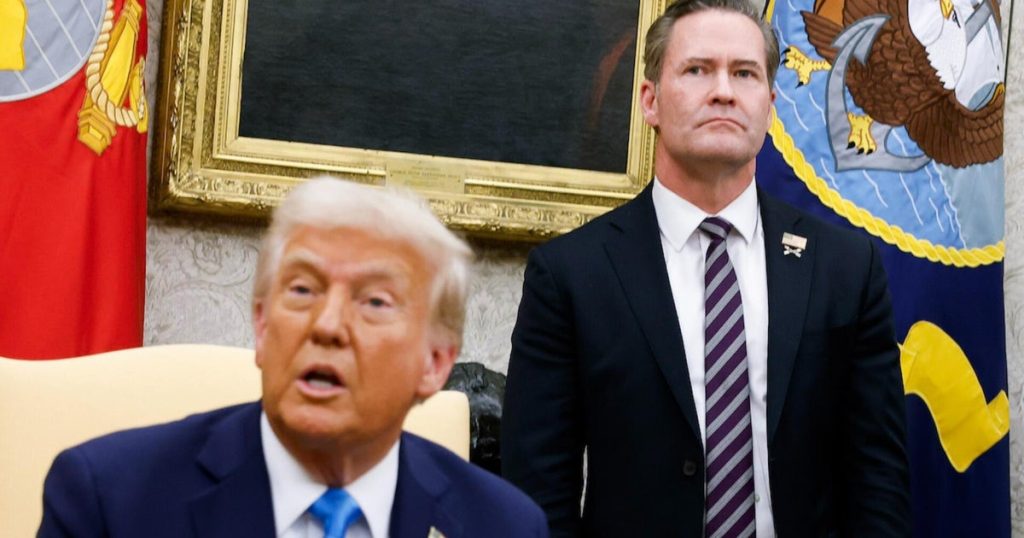In a significant shakeup, the National Security Council (NSC) has seen the dismissal of at least six staff members, with more terminations anticipated. This move appears to be in response to political pressures and accusations of insufficient loyalty to President Trump. The firings were reportedly influenced by right-wing activist Laura Loomer, who presented opposition research to Trump during her recent visit to the Oval Office. Although Loomer claimed to play a role in the dismissals, the President maintained that he alone decides who remains in his administration, stating that he has always been willing to “let go of people.”
| Article Subheadings |
|---|
| 1) Context of the Dismissals |
| 2) The Role of Laura Loomer |
| 3) Impact on National Security Council Personnel |
| 4) Reactions from Officials and Commentators |
| 5) Future Implications for the Administration |
Context of the Dismissals
The recent firings at the National Security Council come amid an administration characterized by high turnover and allegations of loyalty tests. Within the Trump administration, maintaining allegiance has often overshadowed traditional merit-based evaluations of staff capabilities. The dismissals include prominent NSC figures such as Brian Walsh, the senior director for intelligence; Thomas Boodry, the senior director for legislative affairs; and David Feith, another senior director. The timing and nature of these firings suggest a vindictive approach to staffing, with loyalty being the primary currency for job security.
The Role of Laura Loomer
Laura Loomer, known for her polarizing political activism, recently presented President Trump with materials targeting individuals within the NSC, branding them as insufficiently loyal or neoconservative. Loomer’s intervention came during a visit to the Oval Office where she asserted that certain staffers should be removed due to their past affiliations and perceived disloyalty. Loomer’s involvement is particularly highlighted by her assertive stance on social media, where she has questioned not only the allegiances of NSC personnel but also their professional competences. Despite Trump acknowledging her visit, he publicly denied that she was directly responsible for the firings, asserting instead that personnel changes are a normal aspect of his administration.
Impact on National Security Council Personnel
The firings mean a significant shake-up within the NSC, an organization crucial to the formulation of U.S. foreign and security policy. Sources indicate that these firings were not isolated incidents but part of a broader review of staff allegiance and competency following a recent security communication embarrassment involving Mike Waltz, the national security adviser. Officials are reportedly scrutinizing interactions between NSC staff and individuals deemed not aligned with the president’s agenda. Loomer’s involvement appears to have accelerated discussions regarding who remains welcome within the confines of the Oval Office and who does not.
Reactions from Officials and Commentators
Reactions to the firings have been mixed. Some officials express concern about the implications for policymaking, fearing that a lack of diverse viewpoints could undermine national security strategies. Others, particularly within more conservative circles, celebrate the dismissals as a necessary purification of the NSC, rooting out what they view as establishment figures. The NSC spokesman, Brian Hughes, asserted that the council does not comment on its personnel matters, a statement underscoring the opaque nature of the decision-making processes at play. Critics argue that such actions contribute to a culture of fear, stifling dissent and discouraging honest dialogue about critical issues.
Future Implications for the Administration
The ongoing purging of NSC staff has broader implications for the Trump administration and its approach to governance. As this reshuffle of personnel unfolds, the potential for a more homogeneous and ideologically aligned NSC appears likely. While some may interpret this as a strengthening of loyalty within the inner circle, many analysts warn that it could lead to policy-making that disregards valuable input and expertise. The next steps for the administration will be critical in determining how it navigates domestic and international challenges in a rapidly changing global landscape. Observers will be watching closely, anticipating further resignations and firings that may follow the current trend of prioritizing loyalty over experience and wisdom.
| No. | Key Points |
|---|---|
| 1 | At least six staffers have been fired from the National Security Council, with expectations for more dismissals. |
| 2 | Laura Loomer, a right-wing activist, played a role in presenting opposition research to the President. |
| 3 | The firings reflect a pattern of prioritizing loyalty over adherence to traditional administrative protocols within the NSC. |
| 4 | Officials have expressed concerns about the implications of these firings on national security policy and effectiveness. |
| 5 | The administration is under scrutiny for fostering a culture of loyalty-driven personnel changes affecting policymaking. |
Summary
The recent firings at the National Security Council signify a potentially troubling trend towards loyalty-driven decision-making within the Trump administration. As politics increasingly intertwine with essential policy functions, the long-term consequences for U.S. foreign strategy and national security remain uncertain. While some may celebrate the reevaluation of staff loyalty, concerns about the overreach of ideological purging could lead to significant ramifications not only for the personnel involved but also for the broader governmental structure and effectiveness.
Frequently Asked Questions
Question: What prompted the firings at the National Security Council?
The firings were prompted by concerns about staff loyalty to President Trump, particularly in light of opposition research presented by Laura Loomer, who criticized certain staffers as not sufficiently aligned with the administration’s goals.
Question: Who was involved in the recent shakeup at the NSC?
The shakeup involved notable figures such as Brian Walsh, Thomas Boodry, and David Feith, all of whom were senior directors facing dismissal.
Question: How does this situation affect U.S. national security policy?
With the firings potentially reflecting a focus on loyalty over expertise, there are concerns that diverse perspectives may be lost, which could hinder effective policymaking and strategic planning within the NSC.


